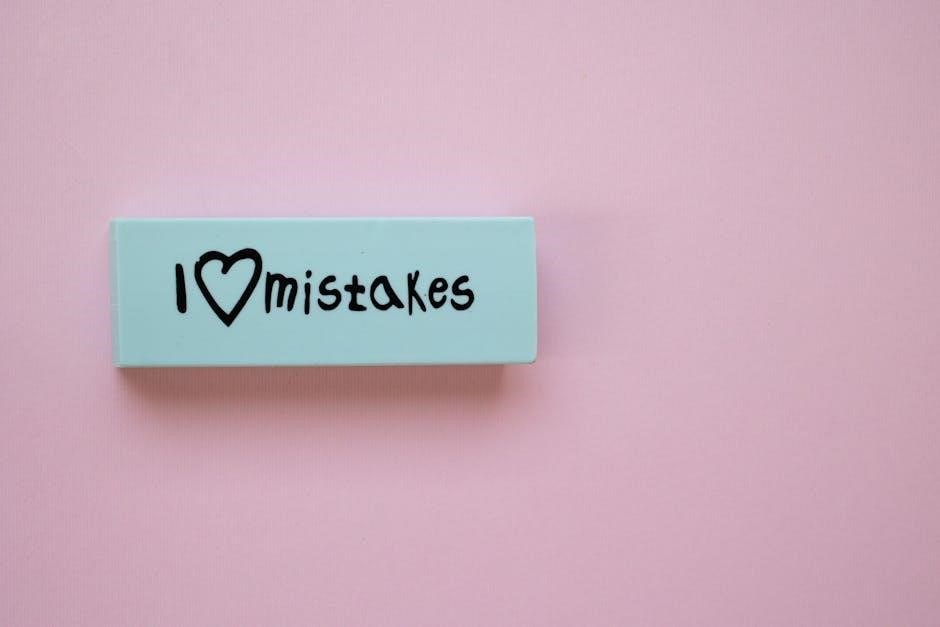“Mistakes Were Made but Not by Me” by Carol Tavris and Elliot Aronson explores the universal human tendency to avoid accountability for errors. This insightful book reveals how cognitive biases and self-deception shape our behavior‚ offering a compelling blend of psychology‚ real-life examples‚ and practical wisdom to foster personal growth and better relationships;
1.1. Overview of the Book
“Mistakes Were Made but Not by Me” by Carol Tavris and Elliot Aronson delves into the psychology behind self-deception and the mechanisms people use to avoid accountability. The book explores how cognitive biases‚ particularly cognitive dissonance‚ drive individuals to justify their mistakes rather than admit fault. Through engaging anecdotes and scientific research‚ Tavris and Aronson explain why people cling to flawed beliefs and how this tendency harms personal relationships‚ workplaces‚ and societal progress. They emphasize the role of memory distortion and the ways in which selective recall shapes our perceptions of past events. The authors also offer practical advice for overcoming these biases‚ fostering a growth mindset‚ and embracing accountability. This book is a compelling exploration of human behavior‚ offering insights for personal and collective improvement.
1.2. Importance of Understanding Cognitive Biases
Understanding cognitive biases is crucial for personal growth and fostering healthy relationships. Cognitive biases distort our perceptions‚ leading to irrational decisions and a reluctance to admit mistakes. By recognizing these biases‚ individuals can break free from the cycle of self-deception and denial‚ fostering accountability and emotional intelligence. This awareness also enhances empathy and communication‚ reducing conflict in personal and professional settings. Moreover‚ acknowledging cognitive biases promotes a culture of transparency and trust‚ essential for societal progress. The insights from “Mistakes Were Made but Not by Me” empower readers to confront their flaws constructively‚ leading to more authentic and meaningful interactions. This understanding is vital for navigating life’s challenges with honesty and resilience‚ ultimately enriching both individual and collective well-being.

Key Concepts in “Mistakes Were Made But Not By Me”
The book explores how cognitive dissonance and self-justification drive human behavior‚ revealing why we struggle to admit mistakes and how this impacts decision-making and relationships;
2.1. Cognitive Dissonance and Self-Deception
Cognitive dissonance‚ a psychological concept introduced by Leon Festinger‚ refers to the mental discomfort experienced when holding conflicting thoughts or behaviors. In Mistakes Were Made but Not by Me‚ Tavris and Aronson explain how individuals often resolve this discomfort through self-deception‚ distorting reality to align their actions with their self-image. This mechanism prevents people from acknowledging their mistakes‚ as doing so would threaten their sense of morality and competence. Self-deception is not intentional lying but rather an unconscious process that protects ego and maintains a coherent narrative of oneself as ethical and rational. Understanding this psychological dynamic is crucial for recognizing how it influences decision-making‚ relationships‚ and personal growth. The authors provide compelling examples of how this cognitive bias operates in everyday life‚ from personal relationships to workplace interactions.
2.2. The Psychology of Self-Justification
The psychology of self-justification reveals how individuals rationalize their mistakes to maintain a positive self-image. According to Tavris and Aronson‚ this process involves rewriting the past to align with one’s values and beliefs. People often manipulate memories‚ shift blame‚ or reinterpret events to avoid guilt or shame. This behavior is not malicious but stems from a deep psychological need to preserve self-esteem. Self-justification becomes problematic when it prevents individuals from learning from errors‚ damaging relationships and hindering personal growth. The book highlights how this mindset is deeply ingrained‚ making it a significant barrier to accountability and self-awareness. By understanding these psychological mechanisms‚ readers can recognize and challenge their own tendencies to justify mistakes rather than confront them constructively.

The Role of Memory in Mistakes
Memory plays a crucial role in how we perceive and justify mistakes‚ often distorting reality to align with our self-image and protect our ego from blame and accountability.
3.1. How Memory Distorts Reality
Memory is a highly unreliable narrator‚ often rewriting past events to align with our current beliefs and self-image. This distortion stems from cognitive dissonance‚ as people unconsciously alter memories to avoid guilt or shame. Selective recall and confirmation bias further skew our recollections‚ making us remember events that reinforce our self-perception while forgetting those that contradict it. Emotional experiences and social influences also shape memory‚ leading to a reality that is more comforting than accurate. Over time‚ these distortions become ingrained‚ making it difficult to distinguish fact from fiction. This process not only protects our ego but also perpetuates cycles of self-deception and justification.
3.2. The Impact of Biased Recall
Biased recall significantly influences how we interpret past events‚ often leading to a skewed perception of reality; This distortion protects our ego by making us believe we were right or blameless‚ even when evidence suggests otherwise. Over time‚ repeated recollection of these biased memories reinforces false narratives‚ making them feel truthful. This process undermines personal growth‚ as it prevents individuals from acknowledging and learning from their mistakes. In relationships‚ biased recall can escalate conflicts‚ as each person remembers events in a way that justifies their actions and shifts blame onto others. Ultimately‚ this selective memory hinders accountability and fosters a cycle of self-deception that is difficult to break.

The Science of Excuse-Making
Excuse-making is a deeply ingrained psychological mechanism that protects individuals from the discomfort of admitting fault. Rooted in cognitive biases and self-deception‚ it distorts reality to avoid accountability‚ perpetuating cycles of denial and justification.
4.1. The Mechanics of Rationalization
Rationalization is a psychological process where individuals create logical explanations to justify irrational or unacceptable behavior. It often involves rewriting history to align actions with self-image‚ reducing cognitive dissonance. People employ strategies like blaming external circumstances‚ downplaying consequences‚ or shifting responsibility to others. This mechanism allows individuals to maintain a positive self-view while avoiding accountability. Rationalization can be subtle‚ even unconscious‚ making it difficult to recognize. Over time‚ it becomes a habitual response to mistakes‚ reinforcing a cycle of self-deception. The book highlights how this process not only distorts reality but also hinders personal growth and relationships. Understanding these mechanics is crucial for breaking the cycle of denial and fostering accountability.
4.2. Why People Avoid Taking Responsibility
People often avoid taking responsibility for mistakes due to fear of guilt‚ shame‚ or repercussions. This avoidance stems from a deep-seated need to protect self-esteem and maintain a positive self-image. When confronted with errors‚ individuals may feel their identity is threatened‚ leading to defensive mechanisms like denial or blame-shifting; The fear of being judged harshly by others or themselves exacerbates this tendency. Additionally‚ societal pressures to appear competent and infallible can make admitting mistakes feel risky. Over time‚ this avoidance becomes a habitual response‚ reinforced by the psychological comfort of self-justification. The book explains how this behavior not only hinders personal growth but also damages relationships and trust. Recognizing these patterns is the first step toward fostering accountability and healthier interactions.

Real-Life Examples of Self-Justification
The book illustrates how people justify mistakes in personal relationships‚ workplace errors‚ and everyday decisions‚ highlighting the pervasive nature of self-deception in maintaining a positive self-image.
5.1. Personal Relationships and Mistakes
In personal relationships‚ self-justification often leads to unresolved conflicts and damaged trust. When individuals refuse to acknowledge their errors‚ they may shift blame onto their partner or rationalize their actions. This pattern of behavior can escalate misunderstandings and prevent genuine resolution. For example‚ someone who forgets an important event might downplay its significance rather than apologize sincerely. Such tendencies not only harm intimacy but also reinforce a cycle of defensiveness; The book highlights how this self-deception can erode emotional connections‚ making it harder to address issues openly. By exploring these dynamics‚ the authors emphasize the importance of accountability in nurturing healthy and fulfilling relationships. Recognizing these patterns is the first step toward meaningful change.
5.2. Workplace Errors and Denial
In the workplace‚ errors are inevitable‚ but denial and self-justification often prevent individuals from taking responsibility. Employees and managers alike may blame external factors‚ colleagues‚ or circumstances rather than acknowledging their own roles in mistakes. This denial can lead to recurring errors‚ as issues are not addressed constructively. For instance‚ a manager might attribute a project failure to unrealistic deadlines rather than poor planning. Such behavior fosters a culture of defensiveness‚ stifling collaboration and innovation. The book illustrates how this mindset hinders growth and problem-solving‚ emphasizing the need for accountability to improve workplace efficiency and trust. By understanding these dynamics‚ organizations can promote a culture of openness and learning from mistakes.

The Consequences of Self-Deception
Self-deception prevents personal growth by avoiding accountability and distorting reality‚ leading to strained relationships and a lack of trust. It fosters a cycle of denial and stagnation.
6.1. How Denial Affects Personal Growth
Denial is a psychological defense mechanism that prevents individuals from acknowledging their mistakes‚ hindering personal growth. By refusing to confront reality‚ people avoid accountability and fail to learn from errors. This creates a barrier to self-awareness and introspection‚ essential for development. Chronic denial leads to stagnation‚ as individuals cannot address their flaws or improve their behavior. Over time‚ this mindset damages relationships and opportunities for self-improvement. The book highlights how denial perpetuates a cycle of self-deception‚ making it difficult to embrace change and maturity. Ultimately‚ denial stifles personal growth by preserving a false narrative‚ rather than fostering honesty and progress.
6.2. The Toll on Relationships and Trust
Denial and self-deception erode relationships by fostering mistrust and resentment. When individuals refuse to acknowledge their mistakes‚ others perceive this as dishonesty or lack of accountability. This breakdown in communication and emotional intimacy leads to strained connections. Repeated denial can make others feel invalidated‚ undermining trust and mutual respect. Over time‚ relationships may deteriorate as unresolved issues accumulate. The book illustrates how denial not only damages personal bonds but also creates a toxic environment where genuine understanding and empathy are absent. Without accountability‚ relationships lose their foundation of trust‚ making it difficult to rebuild and maintain meaningful connections.

Overcoming the Tendency to Justify Mistakes
Recognizing cognitive biases and embracing personal responsibility are crucial steps in overcoming self-deception. This chapter provides practical strategies for fostering accountability and promoting healthier relationships.
7.1. The Power of Self-Awareness
Self-awareness is the foundation of overcoming the tendency to justify mistakes. By understanding personal emotions‚ beliefs‚ and thought patterns‚ individuals can recognize biases and emotional triggers that lead to self-deception. This heightened awareness fosters accountability and reduces the need for defensive rationalizations. It encourages introspection‚ allowing people to acknowledge errors without ego interference. Developing self-awareness also improves relationships by promoting honest communication and empathy. Ultimately‚ it creates a mindset open to growth‚ enabling individuals to learn from mistakes rather than deny them.
7.2; Strategies for Accepting Responsibility
Accepting responsibility for mistakes requires intentional strategies that counteract self-deception. One effective approach is to practice self-compassion‚ acknowledging that errors are part of being human. Another strategy is to reframe mistakes as opportunities for growth rather than failures. Encouraging open communication and creating a safe environment where admitting errors is met with understanding rather than blame can also foster accountability. Additionally‚ developing a habit of reflecting on past mistakes and identifying patterns helps build resilience and reduces defensiveness. Finally‚ seeking feedback and being open to criticism are powerful tools for recognizing and owning up to errors. These strategies‚ when consistently applied‚ promote personal integrity and stronger relationships.

The Broader Implications of Cognitive Biases
Cognitive biases shape societal behaviors‚ influencing decisions‚ fostering polarization‚ and escalating conflicts. They perpetuate systemic issues like injustice and inequality‚ highlighting the need for collective awareness and change.
8.1. Societal Consequences of Denial
Collective denial perpetuates societal stagnation‚ preventing addressing issues like inequality and injustice. When groups deny responsibility for systemic problems‚ progress is hindered‚ and marginalized communities suffer. Denial fosters polarization‚ as people cling to beliefs that justify harmful behaviors. Institutions and leaders may avoid accountability‚ perpetuating cycles of injustice. The psychological need to protect group identity often overshadows truth‚ leading to widespread misinformation and mistrust. Denial also hinders environmental and ethical progress‚ as societies resist acknowledging uncomfortable realities. Ultimately‚ societal denial undermines collective growth and perpetuates cycles of blame-shifting‚ making it difficult to achieve meaningful change. Its impact is profound‚ affecting justice‚ equality‚ and global well-being.
8.2. The Role of Cognitive Biases in Decision-Making
Cognitive biases profoundly influence decision-making by skewing perceptions and judgments. These mental shortcuts often lead to irrational choices‚ as individuals favor information that aligns with their preexisting beliefs. Confirmation bias‚ for instance‚ causes people to overlook contradictory evidence‚ while the sunk cost fallacy leads to prolonged investment in failing endeavors. Such biases are amplified in group settings‚ where consensus-seeking can override objective analysis. The psychological need to maintain a positive self-image further distorts decision-making‚ as individuals avoid admitting past mistakes. These biases not only affect personal choices but also organizational and societal decisions‚ reinforcing systemic errors. Recognizing these patterns is crucial for fostering more rational and accountable decision-making processes. By addressing cognitive biases‚ individuals and groups can make wiser‚ more informed choices. Self-awareness is key to mitigating their impact.

Lessons Learned from the Book
“Mistakes Were Made but Not by Me” teaches the importance of acknowledging errors and embracing accountability. It emphasizes self-awareness‚ fostering personal growth‚ and improving relationships by understanding cognitive biases and self-deception.

9.1. Embracing Accountability
Embracing accountability is a cornerstone of personal growth‚ as highlighted in “Mistakes Were Made but Not by Me”. It involves more than just admitting errors; it requires owning them and learning from them. By acknowledging mistakes‚ individuals foster trust‚ respect‚ and stronger relationships. Accountability also promotes self-awareness‚ helping to break the cycle of self-deception and cognitive biases. When people take responsibility‚ they demonstrate maturity and a commitment to improvement. This mindset not only enhances personal integrity but also encourages others to do the same‚ creating a culture of honesty and mutual respect. Ultimately‚ embracing accountability leads to greater self-understanding and healthier relationships‚ both personally and professionally.
9.2. The Importance of Self-Reflection
Self-reflection is a vital tool for overcoming the tendency to justify mistakes‚ as emphasized in “Mistakes Were Made but Not by Me”. By examining personal thoughts‚ feelings‚ and actions‚ individuals can identify patterns of self-deception and cognitive biases. Self-reflection fosters a deeper understanding of one’s role in errors‚ promoting accountability and personal growth. It encourages individuals to question their assumptions and challenge their defenses. Without self-reflection‚ people remain trapped in cycles of denial and blame-shifting. Regular introspection helps individuals develop emotional intelligence and moral courage‚ leading to better decision-making and healthier relationships. Ultimately‚ self-reflection is the foundation for breaking free from the need to justify mistakes and embracing a more honest‚ growth-oriented mindset.
“Mistakes Were Made but Not by Me” offers profound insights into cognitive biases and self-deception‚ highlighting the importance of self-awareness and accountability. Ignoring these truths stunts personal and societal growth‚ urging us to embrace a mindset of honesty and continuous improvement.
10.1. Final Thoughts on the Book’s Message
“Mistakes Were Made but Not by Me” leaves readers with a clear understanding of how self-deception and cognitive biases shape human behavior. The book emphasizes the importance of acknowledging and learning from mistakes rather than denying or justifying them. By fostering self-awareness and accountability‚ individuals can break free from the cycle of self-justification and cultivate healthier relationships‚ both personally and professionally. The authors’ insights encourage a shift from a fixed mindset to a growth-oriented one‚ where admitting errors becomes an opportunity for improvement rather than a source of shame. This transformative perspective not only enhances personal growth but also promotes a more honest and compassionate society.
10.2. Encouraging a Growth Mindset
The book concludes by advocating for a growth mindset‚ where individuals embrace mistakes as opportunities for learning and development. By recognizing the futility of self-deception‚ readers can move beyond denial and towards self-awareness. This shift fosters resilience‚ improved decision-making‚ and stronger relationships. The authors highlight that accountability is not about self-blame but about taking ownership of actions and their consequences. A growth mindset encourages individuals to view challenges as stepping stones rather than obstacles‚ leading to personal and professional fulfillment. Ultimately‚ the book inspires readers to embrace imperfection and strive for continuous improvement‚ creating a foundation for lasting growth and meaningful change in all areas of life.
